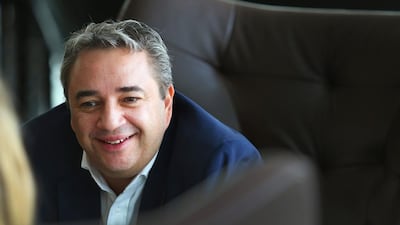Mohamed Bendjebbour, 43, is regional audiovisual attaché at the French ministry of foreign affairs within the French embassy, which is based in Dubai. The Parisian worked in Hollywood and Bollywood and as executive director of the French film and TV office before moving into his current role three years ago.
6.30am
I wake up at this time because I want to catch up with my kids, Leela, nine and Fayzal, six. They love to eat the only thing I can cook, which is scrambled eggs.
7.15am
When the kids leave for school, I read all of the four main UAE newspapers over coffee with my wife. Last week, I discovered a letter from the ambassador of France responding to an article in a previous edition of The National. I also get French news through email news alerts and business news through trade magazines. We are the only embassy in the UAE to have someone completely in charge of cinema, TV and digital. Fifteen years ago, the French ministry of foreign affairs decided that on top of the cultural attaché that you always have in an embassy, cinema was an important part of our culture and business interests. My job is to promote French films and TV programmes, as well as developing exchange.
8.30am
I often have a casual breakfast meeting in Media City on my way to the office, which is traditional in the Parisian media sector. It might be coffee and croissants at Vendome Paris, which has the best croissants and baguettes in the city. This week I had breakfast with the Dubai International Film Festival team to discuss the French participation at this year’s edition, and with Amal Al Agroobi who is a local talented film-maker.
9.30am
I go to my office at the French consulate general in Al Habtoor Business Tower. I read and answer emails, mostly from French producers and TV channels, and write reports for the ministry and the French entertainment and media sector professionals. This week I went to Abu Dhabi to meet the ambassador of France, Michel Miraillet, to discuss the next Cop 21 Environmental film festival we want to organise in November. I have internal meetings with my colleagues at the Business France (French trade office) and Atout France (French tourism office) to explore potential synergies.
1pm
I often have lunch – usually in a French restaurant – with a local partner to assess our partnerships and how we can reinforce them. This week I met with Selim El Azar, chief executive of Gulf Film to discuss upcoming French film releases in the region. The UAE is now the biggest movie market in the Arab world in terms of box office value. This week, the US$60 million French animation film based on the book The Little Prince will be released across the UAE. French producers are the biggest producers of Arab cinema. We consider ourselves the third-biggest film industry after Hollywood and Bollywood in terms of quantity and quality. This year we have about 13 French films being released in the UAE – not so long ago it was nothing. Tastes are evolving.
2.30pm
I'm back at the office for a couple of hours to catch up with cinema producers, TV executives and digital entrepreneurs based in France by phone, Skype or emails. Current topics are the release of The Little Prince and the French participation at Animate Dubai, the first international competitive animation film festival in the region. The hottest topic is French participation at the next Dubai International Film Festival. It is critical to support the festival and make sure French cinema is represented.
5pm
I often have more meetings. This week I was at MBC offices in Media City. I also had a meeting with a representative from Vox Cinema to discuss the next Franco Film Festival that we hold every March at Vox Cinemas in Dubai and Abu Dhabi. We usually have seven movies from Switzerland, Morocco, Canada, France, Tunisia, Lebanon. Usually the most successful films are French or Lebanese.
6.30pm
When I have an evening function, I spend an hour with my kids and watch over their homework. I send emails while they have dinner. My wife is of Algerian origin so she cooks Arabic food. Rather than just reading them a book, I “play” a story when it is bedtime.
8pm
I have screenings, exhibition openings and official functions most evenings. It could be a function at the French Residence in Abu Dhabi, or recently the screening of the Nujoom Al Ghanem film Sounds of the Sea at NYU Abu Dhabi. I offered Nujoom to explore potential screenings of the film in Paris, at the Institut du Monde Arabe, where she has showcased previous films.
10.30pm
Back at home I check emails, social networks and catch up on French news on the French channels on E Life. I’ll play tennis or go swimming if I don’t have a function.
11.30pm
I end my day by writing my to-do list for the next day, and hit the bed with a book. I'm currently reading the history of The Little Prince for the 20th time. I'm asleep by 12.30.
business@thenational.ae
Follow The National's Business section on Twitter

